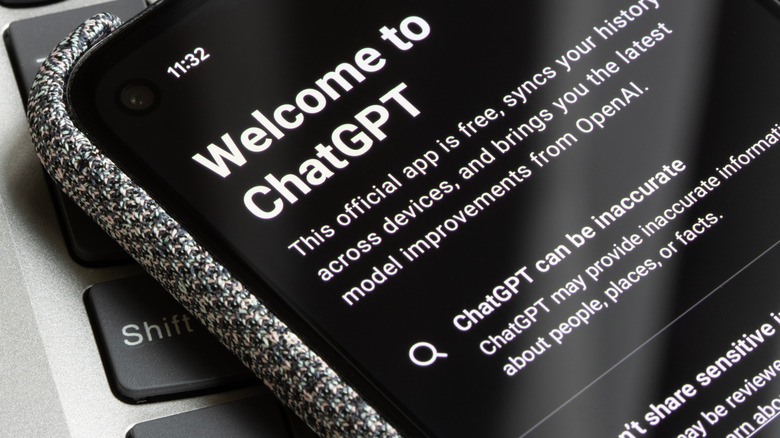2 Major Drawbacks Of Using ChatGPT To Answer Your Burning Finance Questions
According to a report by Advance America, 27% of Americans have unapologetically put more faith in AI bots like ChatGPT for financial management than their partners. The report also revealed that the average American adult is willing to let AI manage $20,000 of their wealth. This seems like a lot of trust to put in a chatbot, leading people to speculate about AI's impact on the financial advisory industry. However, the language model itself is keen to let people know about its inadequacies as a financial advisor.
When asked to pick between two investment options, the first thing ChatGPT spits out is a disclaimer warning that nothing it says is personal advice. Users need to take this disclaimer seriously. Acting blindly on ChatGPT responses without letting it filter through expert eyes can not just be risky due to factual inaccuracies, but also pose a serious threat to the privacy of your sensitive financial information.
Some of the personal finance data that you might be tempted to share include bank account details, social security numbers, passwords, and tax information. But a complete lack of regulatory accountability makes this incredibly risky. Due to the drawbacks of using AI for financial advice, a 2023 investor survey revealed that three out of four investors from Morgan Stanley Wealth Management believe AI will assist financial advisors in helping their clients, but four out of five think it will never completely replace human guidance.
You'll be more at risk if your data is leaked
Sharing personal information with ChatGPT can be very tempting. Since the wizard already offers instant answers to seemingly every possible query related to financial literacy, it's understandable that users may want to feed it exact numbers and figures from their balance sheet to get more specific responses. Plus, it is undeniably easier to share a file and let ChatGPT consume your stock portfolio in seconds than it is to summarize your financial situation yourself.
The problem is that not everybody is aware that ChatGPT stores your conversations by default. Unless you turn off this feature, any sensitive data you share with it is vulnerable if your account gets hacked. OpenAI, the company that owns ChatGPT, uses a subset of all conversations to train its AI models. If your data falls into the wrong hands, this can lead to identity scams or financial frauds.
A recent court case with the New York Times resulted in a court order prohibiting OpenAI from deleting any stored data in its servers. Although this order has now been terminated, it's a reminder to ChatGPT users that it's possible there could be similar court orders in the future. Apart from the obvious step of not sharing sensitive information in the first place, you can mitigate this risk by either manually switching off sharing your data for training purposes or upgrading to an enterprise version, which offers more robust security features.
ChatGPT can serve inaccurate financial information
Financial advice provided by ChatGPT poses the risk of being factually incorrect and lacking personalization. Although the advent of ChatGPT was hailed as one of the greatest breakthroughs in computing by the likes of Jensen Huang –- and made Nvidia one of the best-performing stocks of 2023 –- the OpenAI chatbot's financial advice has repeatedly failed to impress AI researchers. Experts from the Walter Bradley Center have categorized its responses as "consistently verbose but often incorrect", per Mind Matters. However, the real danger illuminated by the experts lay not just in the financial inaccuracies and mathematical errors made by chatbots like ChatGPT, but the "reassuring illusion of human-like intelligence" they projected. Users can easily mistake this air of confidence as factual correctness and act on the advice.
ChatGPT can't act as a substitute for a financial advisor because it can rely on financial information that's incorrect or out-of-date. It generates likely-sounding advice based on data, without understanding financial nuances or users' circumstances. Despite Oracle's market jump indicating investors have big hopes for AI, for the time being, it's best to heavily scrutinize any information that comes out of ChatGPT. You can use it to upgrade your financial literacy on generalized topics, but avoid taking investment advice or giving away personal details.


